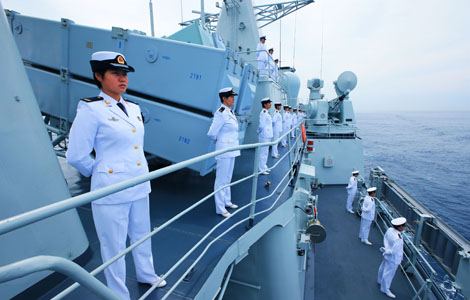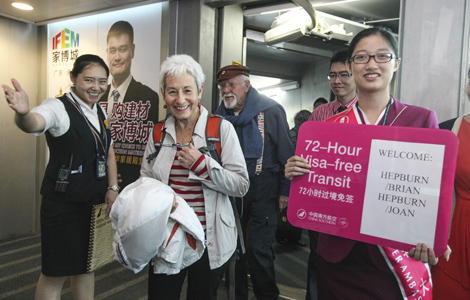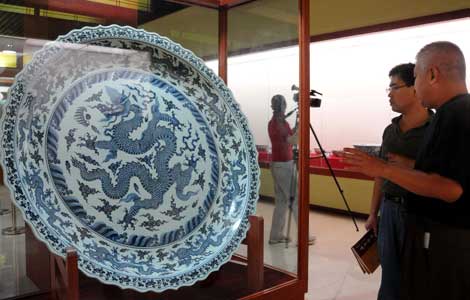China blasts US Senate resolution
Updated: 2013-08-02 11:05
By Zhang Yuwei in New York (China Daily)
|
||||||||
China criticized on Thursday a US Senate resolution expressing concern over China's stance on the disputed East and South China Seas, "strongly" opposing the US' putting blame on China.
China Foreign Ministry spokeswoman Hua Chun-ying said the resolution "sent the wrong message" with no regard for history or fact.
Hua said China "has lodged solemn representations to the US".
"We urge relevant US senators to respect the facts and correct their mistakes so as not to make matters and the regional situation more complicated," she added.
The complaint was in response to a resolution - passed on Monday - that puts pressure on China over territorial disputes in the East China Sea and South China Sea by "reaffirming the strong support of the US for the peaceful resolution of territorial, sovereignty and jurisdictional disputes in the Asia-Pacific maritime domains".
"The disputed islands in the East China Sea and the South China Sea are both part of China's territory and have been since ancient times," said Hua. "Due to historical factors, however, some of China's neighbors have disputed China's ownership of the islands."
Jon Taylor, a professor of political science at the University of St. Thomas in Houston, said China reacted "swiftly and vociferously" to this "strategic and national pride issue" and it didn't surprise him.
"The US Senate - in a subtle way - is trying to do something that President Obama or Secretary Kerry would not do directly themselves: try to publicly pressure China on the Diaoyu Islands and Huangyan Island," said Taylor.
"I suspect that this was timed as a follow-up to the summit that Obama had with Vietnamese President Truong Tan Sang, perhaps quietly agreed to during their summit," he added.
"However, while the resolution exacerbates an already difficult dispute, a US Senate resolution has no teeth, no power, and merely expresses the opinion of the members present," said Taylor.
"We are facing a moment where there is still ample opportunity for the countries of the region, including China and the US, to find common ground. But without the effort to demonstrate cooperative intent and action, a spiral of tensions in the region is likely," said Sheila A. Smith, a senior fellow for Japan studies at the Council on Foreign Relations.
After World War II, the Diaoyu Islands and other Chinese territories occupied by Japan were returned to China in accordance with the Cairo Declaration, the Potsdam Proclamation and other international treaties.
The islands issue has emerged as one of the biggest security concerns in Asia.
"Regarding a practical way for China, its neighbors, and the US to treat this dispute, China will need to continue to engage in soft diplomacy as a rebuttal to US statements, as well as face-to-face negotiations with the nations that dispute China's claims," said Taylor.
While the recent move from the Senate is not going to largely overshadow the positive tone established by top leaders of the world's two largest economies by a recent "rare" summit in California, the US needs to understand China's security concerns and "take a low-key approach to the dispute by maintaining an equidistant diplomatic route on the Diaoyus and Huangyan", said Taylor.
Tensions between Japan and China escalated following the Japanese government's unilateral move to "nationalize" part of the Diaoyu Islands last September. Both countries expressed their strong views during the UN General Assembly last year when leaders from the 193 UN member states gathered to discuss pressing international issues.
In April 2012, a Philippine warship entered the waters off Huangyan Island with "protecting sovereignty" as an excuse to harass Chinese fishermen who were taking shelter in a lagoon during a storm.
The Philippines recently sent fresh troops and supplies to the Ren'ai Reef, where it grounded one of its warships illegally in 1999. The country has repeatedly cited "technical problems" in response to China's request to have the ship towed away.
Manila, on the other hand, has accused China of "encroaching on its territory" after Chinese maritime surveillance ships patrolled waters near the Ren'ai Reef.
Agencies contributed to this story.
yuweizhang@chinadailyusa.com
(China Daily USA 08/02/2013 page1)
- Abe: No dealing on Diaoyu Islands
- China urges Japan back to talk on Diaoyu
- China hopes to maintain South China Sea peace
- Submersible taps vast mineral deposits in South China Sea
- China starts annual South China Sea fishing ban
- ASEAN leaders stress peace in South China Sea
- US seeks co-op with Brunei on South China Sea
Most Viewed
Editor's Picks

|

|

|

|

|

|
Today's Top News
China sails through 'first island chain'
US should reclaim 10% share
Chinese worry about image abroad
China blasts US Senate resolution
NSA chief details program at hackers' conference
US, Pakistan to start new chapter in relations
Medical giant loses antitrust lawsuit
Imbalance seen in Sino-US talent exchanges
US Weekly

|

|















